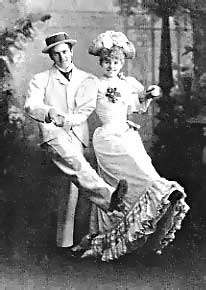Morocco Bound
Morocco Bound is a farcical English Edwardian musical comedy in two acts by Arthur Branscombe, with music by F. Osmond Carr and lyrics by Adrian Ross. It opened at the Shaftesbury Theatre in London, on 13 April 1893, under the management of Fred J. Harris, and transferred to the Trafalgar Square Theatre on 8 January 1894, running for a total of 295 performances. A young George Grossmith, Jr. was in the cast (where he made the most of the small role of Sir Percy Pimpleton by adding ad-libs), as was Letty Lind. Harry Grattan and Richard Temple later joined the cast.
This musical opened in the same year as Gilbert and Sullivan's Utopia, Limited and shared a number of features with that opera, including a distant, exotic locale, and both presented British archetypes as exemplars.[1] Morocco Bound crystallized the music-hall influenced "variety musical" form and was more representative than Utopia of the prevailing taste of London theatre audiences, which was turning away from comic opera.
Roles

- Spoofah Bey (An Irish Con-Man) - Mr. John L. Shine
- Squire Higgins (One Of The Nouveau-Riche) - Charles Danby
- Vivian Higgins (The Squire's Eldest Son) - Sydney Barraclough
- Dolly Higgins (Another Of The Squire's Sons) - Alfred C. Seymour
- Josiah Higgins (The Squire's Brother) - Herbert Sparling
- Lord Percy Pimpleton - George Grossmith Jr.
- Sid Fakah (Moroccan Grand Vizier) - Colin Coop
- Musket (A Servant) - Douglas Munro
- Maude Sportington (Dolly's Girl-Friend) - Letty Lind
- Ethel Sportington (Vivian's Girl-Friend) - Violet Cameron
- Comtesse De La Blague (Spoofah's Sister, A Phoney "Countess") - Jennie McNulty
- Lady Walkover (Maude's Friend) - Agnes Hewitt
- Rhea Porter (A Lady Journalist) - Marie Studholme
- Eva Sketchley - Eva Westlake
- Hilda Adlette - Ruby Temple
Synopsis
An Irish adventurer enlists the help of a retired costermonger and an assortment of British characters to travel to Morocco, where the Irishman had hopes of winning the right to sell theatre concessions. Once there, he fools the local Vizier into believing that his companions are representatives of "the flower of the British music hall" and eventually secures his business venture.
Musical numbers
|
|